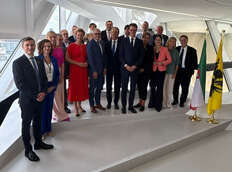- Port of Antwerp-Bruges aims to import one million tons of hydrogen equivalents annually by 2030.
- The port is investing in facilities for low-carbon hydrogen, ammonia, methanol, and biofuels.
- Port of Antwerp-Bruges and duisport are investing in cross-border infrastructure and green corridors.
- Flanders and North Rhine-Westphalia focus on renewable energy, circular economy, and knowledge sharing.

Energy Transition and Industrial Cooperation
On 27 June, representatives from the Flemish Government and North Rhine-Westphalia met at Port of Antwerp-Bruges for discussions on energy transition and industrial cooperation. The session coincided with the Energy Talks, focusing on cross-border energy infrastructure and the European Clean Industrial Deal.
Strategic Importance of the Port
As a key logistics hub, the port plays a crucial role in connecting Flanders and North Rhine-Westphalia. It serves as a major export partner for Germany, with strong connections via rail, inland navigation, and pipelines. The port's partnership with duisport enhances this connectivity, supporting investments in cross-border infrastructure and green industrial corridors.
Focus on Hydrogen and CO₂
Port of Antwerp-Bruges is actively investing in facilities for importing low-carbon hydrogen, ammonia, methanol, and biofuels. By 2030, the port aims to import one million tons of hydrogen equivalents annually, supporting industrial clusters in Germany and other European countries. The port is also developing a large-scale carbon transport network.
Commitment to Sustainability
The discussions highlighted the shared ambition of Flanders and North Rhine-Westphalia in renewable energy, circular economy, and knowledge sharing. The Energy Talks emphasized the importance of public-private partnerships in achieving these goals. The port's efforts align with the European Clean Industrial Deal, aiming for a competitive and climate-neutral industry.

